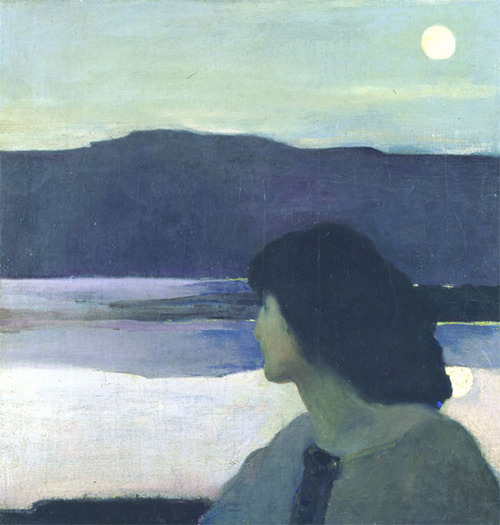
Myōe (Japanese Zen priest, writing in 1224):
Painting: Arthur Beecher Carles, Silence (1908)
Video: Bell ringing in the dawn at Deer Park Monastery, California
The winter moon comes from the clouds to keep me company.Myoe gives an unusually detailed account of its origins: “On the night of the twelfth day of the twelfth month of the year 1224, the moon was behind clouds. I sat in Zen meditation in the Kakyu Hall. When the hour of the midnight vigil came, I ceased meditation and descended from the hall on the peak to the lower quarters, and as I did so the moon came from the clouds and set the snow aglow. The moon was my companion, and not even the wolf howling in the valley brought fear. When, presently, I came out of the lower quarters again, the moon was again behind clouds. As the bell was signalling the late-night vigil, I made my way once more to the peak, and the moon saw me on the way. I entered the meditation hall, and the moon, chasing the clouds, was about to sink behind the peak beyond, and it seemed to me that it was keeping me secret company.” He then went on to compose a second poem:
The wind is piercing, the snow is cold.
I shall go behind the mountain. Go there too, O moon.After spending the rest of the night in the meditation hall, he opens his eyes to see the moon in the dawn, lighting up the window. “In a dark place myself, I felt as if my own heart were glowing with light which seemed to be that of the moon.” There follows a third poem:
Night after night we shall keep each other company.
My heart shines, a pure expanse of light;Excerpted from the Nobel prize lecture of Yasunari Kawabata (1968)
And no doubt the moon will think the light its own.
Painting: Arthur Beecher Carles, Silence (1908)
Video: Bell ringing in the dawn at Deer Park Monastery, California
Sitting here this morning, listening to the monk ringing down on that powerful temple bell, I feel my owjn heart lifted.
ReplyDeleteHow tough were our ancestors! Not only in Japan did monks and nuns lead such harsh lives . . .
Yeah! knew you'd like this. (It's based on the beginning of the same Nobel prize speech by Yasunari Kawabata that Tiina posted... he talks about Ikkyu later.)
ReplyDeleteTough, and sometimes a little lonely.
But the moon provides solace from both fear and solitude.
Blessings!
_()_
ReplyDeleteI do not see harshness here, but a sense of beauty and oneness.
ReplyDeleteThanks for posting it. I have not read it before and its lovely.
Yep! Glad you enjoyed! :)
ReplyDelete: )
ReplyDelete